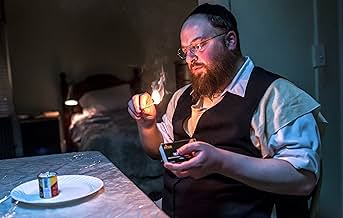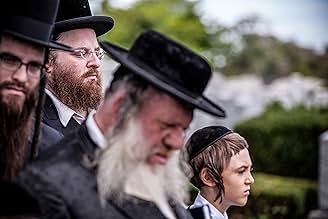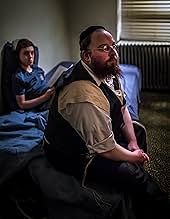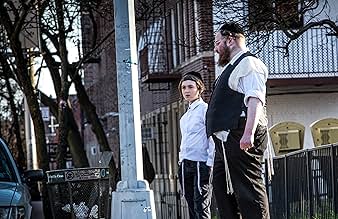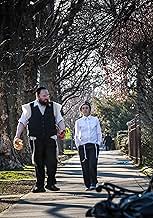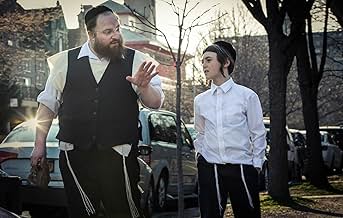IMDb रेटिंग
6.6/10
2.7 हज़ार
आपकी रेटिंग
अपनी भाषा में प्लॉट जोड़ेंWithin Brooklyn's ultra-orthodox Jewish community, a widower battles for custody of his son. A tender drama performed entirely in Yiddish, the film intimately explores the nature of faith an... सभी पढ़ेंWithin Brooklyn's ultra-orthodox Jewish community, a widower battles for custody of his son. A tender drama performed entirely in Yiddish, the film intimately explores the nature of faith and the price of parenthood.Within Brooklyn's ultra-orthodox Jewish community, a widower battles for custody of his son. A tender drama performed entirely in Yiddish, the film intimately explores the nature of faith and the price of parenthood.
- पुरस्कार
- 7 जीत और कुल 18 नामांकन
Meir Ber Schwartz
- The Ruv
- (as Meyer Schwartz)
Melissa Weisz
- Bayla
- (वॉइस)
फ़ीचर्ड समीक्षाएं
This movie causes tremendous anguish, okay Menashe can't be considered what we usually call a responsible adult, but the rules on fatherhood revolted me extremely, it hurt, to see the love for the child and the mandatory absence (no father and mother a child can't study) absurd... Slow, delicate, simple, a pure portrait of father/son love and Jewish traditions. Menashe's plot is loosely based on Lustig's life. In an interview with the Los Angeles Times, he said that "unlike Menashe in the movie, I'm not a schlimazel by nature. Maybe just a schlimazel by situation."
This quiet drama portrays the scuffling life of a man within the Hasidic community in Brooklyn as he endeavors to regain custody of his son in the aftermath of his wife's passing. He is expected to find a new wife and achieve stability as he holds down a low-paying, labor-intensive job as a grocery clerk that drains him of his time and his spirit. He has difficulty keeping his own modest life in order, let alone being strong enough to provide for another human being.
His efforts to better himself in order to regain custody of his son are met with dismissal from those around him, including his more devout and financially stable brother-in-law whom the community has decided should look after the man's son. He gets little encouragement from those within his community, yet he persists.
There is a considerable schism within the Hasidic community that comes to light in this film, especially on account of the man's less-than-pious lifestyle and more secular demeanor. He doesn't readily embrace the hard-line teachings of his sect as forcefully as his peers, but he nevertheless wants what's best for his son and wants to fulfill the requirements of his denomination in order to remain a real father. In that regard, this is an exceptional portrayal of loyalty to one's religious faith in the face of ongoing personal conflict. It's definitely not for many viewers who wouldn't relate to religious doctrine as a deciding force in one's life, but it's still a story that's effectively conveyed and devoid of proselytizing. Recommended to open-minded viewers.
His efforts to better himself in order to regain custody of his son are met with dismissal from those around him, including his more devout and financially stable brother-in-law whom the community has decided should look after the man's son. He gets little encouragement from those within his community, yet he persists.
There is a considerable schism within the Hasidic community that comes to light in this film, especially on account of the man's less-than-pious lifestyle and more secular demeanor. He doesn't readily embrace the hard-line teachings of his sect as forcefully as his peers, but he nevertheless wants what's best for his son and wants to fulfill the requirements of his denomination in order to remain a real father. In that regard, this is an exceptional portrayal of loyalty to one's religious faith in the face of ongoing personal conflict. It's definitely not for many viewers who wouldn't relate to religious doctrine as a deciding force in one's life, but it's still a story that's effectively conveyed and devoid of proselytizing. Recommended to open-minded viewers.
"Menashe" is a semi-documentary, reflecting the case of Menashe Lustig, the actor performed the main character. A film about laws of an ultra conservative community, about parenthood and about life. And , sure, about vulnerable people. Touching and delicate and precise, the work of Menashe Lustig is just admirable. He is the film and I admitt, I saw me reflected in his beautiful portrait of the single father , lost across the challenges, naive and man of good intentions, prisoner of his life. So, a gem . A real special one because it is not a lesson but a confession, honest at whole.
Struggle is something that is universal. Adversity doesn't care who you are, where you have come from, or even who you know. Granted, it can be relative, but no matter who you are, road blocks are still road blocks. Documentarian and first-time narrative director Joshua Z. Weinstein takes this theme but looks at it from a different direction with "Menashe," featured at this year's Dallas International Film Festival and now getting a wider release.
The title character is played by Menashe Lustig and is a widower who is just trying to get by in his ultra-orthodox Jewish community. He is still mourning the loss of his wife a year later while constantly chasing his bills working at a local Jewish market, and he is also dealing with the fact that he does not have custody of his son, Rieven (Ruben Nidorski) due to his religious beliefs that children must be raised in a two-parent household. Until he remarries, Rieven has to live with his brother, Eizik (Yoel Weisshaus), and his family. Menashe has always been seen as the lesser of his siblings, so he embarks on a journey of self-discovery and responsibility just to try for a normal life.
Weinstein takes his documentary-style of filming (with no score and a lot of steady-cam shots) and applies it here, which gives it an intimate feel that really enhanced my emotional investment into his story (which he also co-wrote with Alex Lipschultz). In my comments to our vendor after the screening, I used the phrase "both heartbreaking and heartwarming," and this is the best way I can describe "Menashe". Lustig plays the lead character in a way that even though his struggles are specific to a demographic, there are themes of independence, responsibility, and family that each and every one of us can identify with and feel for him during. His work with Nidorski is very organic, and it works on every level. Almost the entire film is translated from Yiddish, but as real and powerful as this story is, the subtitling bothered me even less than it normally does.
It is true that this film may not be seen as "for everyone" due to the community that it takes place in, but I fully and whole-heartedly disagree. Its universal themes are presented in a way that its context is well-explained so that the audience can see why the traditions are what they are. Much like "Donovan" earlier this year, "Menashe" is an independent film that tells its story in an honest and grounded way that deserves to be seen by as large of an audience as possible.
The title character is played by Menashe Lustig and is a widower who is just trying to get by in his ultra-orthodox Jewish community. He is still mourning the loss of his wife a year later while constantly chasing his bills working at a local Jewish market, and he is also dealing with the fact that he does not have custody of his son, Rieven (Ruben Nidorski) due to his religious beliefs that children must be raised in a two-parent household. Until he remarries, Rieven has to live with his brother, Eizik (Yoel Weisshaus), and his family. Menashe has always been seen as the lesser of his siblings, so he embarks on a journey of self-discovery and responsibility just to try for a normal life.
Weinstein takes his documentary-style of filming (with no score and a lot of steady-cam shots) and applies it here, which gives it an intimate feel that really enhanced my emotional investment into his story (which he also co-wrote with Alex Lipschultz). In my comments to our vendor after the screening, I used the phrase "both heartbreaking and heartwarming," and this is the best way I can describe "Menashe". Lustig plays the lead character in a way that even though his struggles are specific to a demographic, there are themes of independence, responsibility, and family that each and every one of us can identify with and feel for him during. His work with Nidorski is very organic, and it works on every level. Almost the entire film is translated from Yiddish, but as real and powerful as this story is, the subtitling bothered me even less than it normally does.
It is true that this film may not be seen as "for everyone" due to the community that it takes place in, but I fully and whole-heartedly disagree. Its universal themes are presented in a way that its context is well-explained so that the audience can see why the traditions are what they are. Much like "Donovan" earlier this year, "Menashe" is an independent film that tells its story in an honest and grounded way that deserves to be seen by as large of an audience as possible.
This particular genre is a bit like found footage horror: a lot of new film makers see it as an easy and affordable way of getting their foot in the door.
A restrained but curiously authentic feeling story that is not itself about Menashe getting remarried (as it is often advertized) but more about him dealing with the pressure to do so. There is something horribly feasible in the premise and the writing is naturalistic without ever becoming drab or dull. This is a story you can believe is happening right now in little communities all over the world and it tells this story without sensationalism or soap opera heaviness.
The narrative is fragmented into episodes of Menashe having fun with his son, doing his job and Jewish stuff. It's a serene and rather charming vision into the life of someone is really just a regular guy, he happens to just be part of a particular community he has no desire to subvert or part from, yet find himself victim to the values he has implicitly accepted.
The film is at its most charming when Menashe is with his son. The details of this brand of Judaism which Menashe tries uphold and pass down to him really make the movie memorable and touching while those very same values strive to keep them apart.
This will not be everyone's cup of tea: although nothing transgressive it will simply be too leisurely and uneventful for many people and this is indeed a movie where you just have to feel the moment: the prayers at a cemetery, picking a painting of a Rabbi etc. You may easily find it hard to stay awake or watch this in one sitting. But for what it is, it is pretty much note perfect and leaves you with a powerful sense of the quite desperation and helplessness that so many of us just have to live with.
There is a moment where I was holding my breath, you'll know it when you see it...
A restrained but curiously authentic feeling story that is not itself about Menashe getting remarried (as it is often advertized) but more about him dealing with the pressure to do so. There is something horribly feasible in the premise and the writing is naturalistic without ever becoming drab or dull. This is a story you can believe is happening right now in little communities all over the world and it tells this story without sensationalism or soap opera heaviness.
The narrative is fragmented into episodes of Menashe having fun with his son, doing his job and Jewish stuff. It's a serene and rather charming vision into the life of someone is really just a regular guy, he happens to just be part of a particular community he has no desire to subvert or part from, yet find himself victim to the values he has implicitly accepted.
The film is at its most charming when Menashe is with his son. The details of this brand of Judaism which Menashe tries uphold and pass down to him really make the movie memorable and touching while those very same values strive to keep them apart.
This will not be everyone's cup of tea: although nothing transgressive it will simply be too leisurely and uneventful for many people and this is indeed a movie where you just have to feel the moment: the prayers at a cemetery, picking a painting of a Rabbi etc. You may easily find it hard to stay awake or watch this in one sitting. But for what it is, it is pretty much note perfect and leaves you with a powerful sense of the quite desperation and helplessness that so many of us just have to live with.
There is a moment where I was holding my breath, you'll know it when you see it...
क्या आपको पता है
- ट्रिवियाDirector Joshua Z Weinstein, who is neither a member of a Haredi community nor a speaker of Yiddish, used a translator on set.
- साउंडट्रैकIvdu Es Hashem Mit Simcha
Written and performed by Michoel Schnitzler
Courtesy of Michoel Schnitzler
टॉप पसंद
रेटिंग देने के लिए साइन-इन करें और वैयक्तिकृत सुझावों के लिए वॉचलिस्ट करें
- How long is Menashe?Alexa द्वारा संचालित
विवरण
- रिलीज़ की तारीख़
- कंट्री ऑफ़ ओरिजिन
- आधिकारिक साइट
- भाषाएं
- इस रूप में भी जाना जाता है
- 我和我的不完美老爸
- फ़िल्माने की जगहें
- उत्पादन कंपनियां
- IMDbPro पर और कंपनी क्रेडिट देखें
बॉक्स ऑफ़िस
- US और कनाडा में सकल
- $17,03,036
- US और कनाडा में पहले सप्ताह में कुल कमाई
- $62,078
- 30 जुल॰ 2017
- दुनिया भर में सकल
- $19,62,265
- चलने की अवधि1 घंटा 22 मिनट
- रंग
- ध्वनि मिश्रण
- पक्ष अनुपात
- 2.00 : 1
इस पेज में योगदान दें
किसी बदलाव का सुझाव दें या अनुपलब्ध कॉन्टेंट जोड़ें




